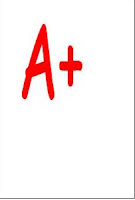Putting Failure in the Spotlight
 |
| Photo credit: Flickr http://goo.gl/mI8NLQ |
Failure to Communicate
My morning session was facilitated by Pernille Ripp (@pernilleripp) author and teacher extraordinaire. The session was entitled: The Empowered School. It was a fantastic conversation that caused me to think about when I say "yes" vs. when I say "no". In addition, the conversation highlighted for me that while I was always very clear with my students about expectations, I have not given the adults that I am now responsible for the same courtesy. Action: communicate to the faculty my expectations if they want me to say "yes" to a tough request. This was indeed an "a-ha" moment for me. This year there have been several people who have come to me with requests that were not the typical "can you get me such-and-such supplies" or "can I do such-and-such with a lesson". To those individual with "big" requests I realized that I said "yes" to those who argued their case and framed their request in such a way as to demonstrate the benefit of their request to our students, and to the school community rather than simply how the request would benefit themselves. This successful approach has never been clearly spelled out for all. So does this mean that I play favorites? No. It means I have not done a good job of communicating my expectations and need to adjust my communication strategies to ensure all my faculty have the opportunity to convince me to say "yes".
Failure to Acknowledge
The other big "a-ha" piece from our conversation with Pernille was the lack of opportunity to acknowledge adults in our community when they do good stuff. Action: find a way to acknowledge and give kudos to the adults in our community. Teachers work really hard doing the best job they can for their students. It is important to recognize these efforts. Period. No matter how old we get, we always appreciate being, and deserve to be, recognized for a job well done. This realization has led to several conversations since the weekend and investigations into different ways to provide recognition for the adults in our community. Stay tuned...
Failure to Reach All
After an incredibly thought-provoking keynote with Dr. Peter Gray who spoke on the role of play in learning (this was an amazing conversation and worthy of it's own post later), I attended a session with Kristen Swanson (@kristenswanson) on PD and came away with the realization that I still have so much to do in order to provide authentic learning experiences for the faculty and staff. I like to think that I have done a good job of re-imagining PD on our site (you can read an earlier blog post on this topic here). However, Kristen's session highlighted some huge holes in the process that we now use. Action: implement the full cycle of User Generated Learning--curation, reflection, contribution--with every PD opportunity. By turning every adult into not only a learner, but also a teacher, the PD opportunities become much richer and the entire community will benefit. Currently our model requires only the curation and reflection steps. Without the contribution step, there is a missed opportunity. So my task this year is to continue to revamp our PD model to actively include the contribution phase. This will be something very new for our community so I envision this being a tough sell for some. That's o.k. If it isn't tough, it isn't worth doing, right?
Whew! What a weekend. Not even a full 48 hours of conference and I now have a pretty challenging to-do list. That's OK, though. If I say I am a lead learner. If I say that I want to model best practices for my staff, then this is a great place to start. I hope to have some follow-up posts that share out the progress I am making in these areas.
Have you attended a conference recently that sent you home with a to-do list? I would love to hear what are you working on this year.



Comments
Post a Comment
Thanks for sharing your thoughts!